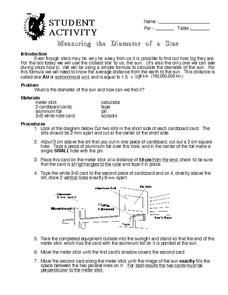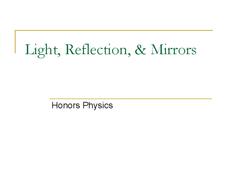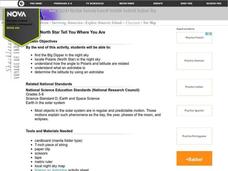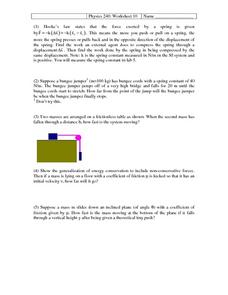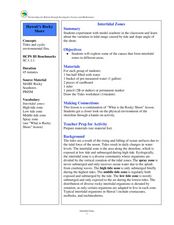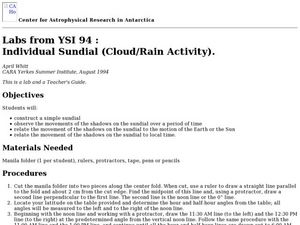Curated OER
Measuring the Earth
Students use principles of geometry to measure the circumference of the Earth. In this applied geometry lesson, students use mathematics to determine scientific information. They make measurements, calculate the central angle, and...
Curated OER
Small Angle Calculations
Students work with circles, angles and estimating angles in the night sky. For this circles and angles lesson, students practice measuring a degree using the circumference of a circle and apply the degree to determine a way to use their...
Curated OER
Measuring The Diameter of a Star
In this space science worksheet, learners find the correct measurements using the tools provided in this lab experiment. The second page is used to record data.
Curated OER
Study of Projectile Motion using Straw Rockets
High schoolers design and launch their own rockets. In this experimental lesson students launch their own rockets and record the various angles and distance that they go. Each student has time to redesign their rocket and...
Curated OER
PROJECTILE MOTION
Students measure muzzle velocity, and predict range of a projectile device. In this motion lesson students complete a lab and explain the outcomes of their experiments.
Curated OER
What's Your Latitude?
Students measure the height of items using an astrolabe. In this latitude lesson students construct a sextant and determine height and latitude with it.
Curated OER
Weather Tools
Students explore Earth science by participating in a weather identification activity. In this scientific instrument instructional activity, students identify several weather related tools such as the weather vane, thermometer and rain...
Bowels Physics
Light, Reflection, and Mirrors
Explore the connection of light, reflection, and mirrors. A comprehensive lesson introduces the basics of light in relation to reflection and mirrors. After an explanation of the vocabulary, the presentation shows how to create ray...
Curated OER
Fitting Periodic Functions-Distant Planets
In this periodic functions worksheet, students use given data of the speed of a star and find the best fit periodic function that follows the trend in data. They determine the amplitude, offset phase and the formula for the angle. They...
Curated OER
Let the North Star Tell You Where You Are
Young scholars participate in activities in which they find the Big Dipper and locate the North Star in the night sky, examine the relationship between the angle to Polaris and latitude, and determine latitude by using an astrolabe.
Curated OER
Measuring The Earth
Students use their geometry and trigonometry skills to determine the distance between their school and another school.
Curated OER
Astronomy With a Stick
High schoolers find the altitude of the Sun at 10 A.M., at solar noon, and at 2 P.M. by measuring the height of the gnomon and the length of the shadow at each time. They record the measurements in their notebooks for later conversion.
Curated OER
Learning Lesson: The Shadow Knows II
Students discover and practice how to calculate the circumference of the Earth. They measure the length of their shadows and use the distance they are away from the equator to complete the calculations. They discuss winter or summer...
Curated OER
Junkyard Wars: Wind Machines
Students explain how wind direction affects sail angle. In this physics lesson, students measure the speed of the yacht while varying different factors. They summarize and share their finding to class.
Curated OER
Let the North Star Tell You Where You Are
Students create an astrolabe and locate the North Star in the night sky. They determine the latitude of the North Star, and calculate an average latitude based on class results.
Curated OER
Big Air Rules
Students discuss projectile motion using a basketball player taking off for a slam dunk, a fly ball launched off a hitter's bat, and a snowboarder flying off a pipe as examples. The lesson is expanded by introducing the mathematical...
Curated OER
Physics 240:10
In this physics 240:10 worksheet, students calculate the speed and distance as presented in the given word problems. Students apply their understanding of Hooke's law to answer the questions provided.
Curated OER
Intertidal Zones
Students explore intertidal zones. In this intertidal zones lesson plan, students work in small groups and use ready-made materials to create a model of intertidal zones. Resources are provided.
Curated OER
Heating Up: Direct and Indirect Sunlight
Students, by conducting simulations, explore the effects of direct and indirect sunlight on heating of the Earth.
Curated OER
Individual Sundial (Cloud/Rain Activity)
Students make a simple sundial to examine the changes in shadows over time. In this sundial and shadow instructional activity, students make a simple sundial out of a manila folder and pencil. They observe how shadows change over time,...
Curated OER
Atmospheric Shielding from Radiation I
In this radiation worksheet, students calculate the distance of a satellite in orbit to determine the placement of a radiation detection device. This worksheet has 2 problems to solve.
Curated OER
Forces and Newton's Laws Unit
Students participate in lessons on Forces and Newton's Laws by selecting activities and assignments to complete in a Layer Unit. Students select assignments and activities in the C Level, B Level, and A Level.
Curated OER
Vectors
Pupils differentiate distance and displacement. In this physics lesson plan, students use formulas to calculate for displacement. They draw vectors using the grid.
Curated OER
Motion Capture and Analysis
Students capture the serve motion of a tennis player with a digital or video camera. Using transparencies or a software package, analyze the speed, acceleration, displacement and time of the racquet head and ball in the tennis stroke.


